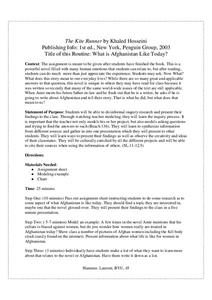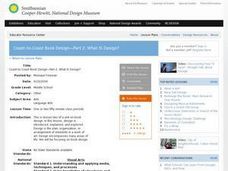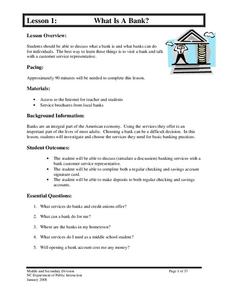Curated OER
Troublesome Words: What is a Troublesome Word?
Referring to words that are often used incorrectly, this resource identifies those "troublesome" terms that can produce confusion and shows learners how they should be used properly. Since even adults have trouble using such words as...
Curated OER
What is Less? 1-10 Subtraction Worksheet
In this subtraction worksheet, students count the items that are pictured and count backward by the amount indicated in each problem. They complete 7 problems by answering the question, "What is __ less?"
K12 Reader
Figurative Language: What Is It?
"Lucky lady." "Straight as an arrow." Here's a figurative language activity that provides middle schoolers with six examples and asks them to identify the literary device modeled.
Curated OER
The Kite Runner: What is Afghanistan Like Today?
After completing Khaled Hosseini's The Kite Runner, readers research a topic of interest and prepare a five-minute presentation, and share their findings with the class.
Curated OER
Coast-to-Coast Book Design-Part 1: What is a book?
In this first of four lessons on book design, students are introduced to the vocabulary of book design through the use of bookwalks and a non-linear PowerPoint presentation in game-show (Jeopardy!) format.
Curated OER
Coast-to-Coast Book Design -Part 2: What is Design?
Learners explore the concept of design, and identify items in their lives that have been designed. They explore the concept of book design and create and arrange their own page layout.
Curated OER
Identifying Supporting Evidence from a Text - What is a Hero?
Pupils define hero and identify supporting evidence in a text. They complete a hero diagram worksheet and watch a video about a little boy from China who acts as a hero. Additionally, they complete the Ping Hero evidence worksheet...
Curated OER
What Is a Watershed?
Students explore the concept of water pollution. In this environmental stewardship lesson, students discover what watersheds are and consider how to protect them.
Curated OER
What is History? Timelines and Oral Histories
Students consider how we learn about the past and discuss how the framing of history is always done by the person who is telling it. They construct a personal and class timelines, compare two or more accounts of the same event and record...
New South Wales Department of Education
Is it Alive?
Interestingly enough, movement is not a characteristic of living things. The first activity in a series of 20 introduces learners to the concepts of living versus non-living things and then focuses on biologists and what they study....
EngageNY
Researching about the Red Cross: What Is a Multinational Aid Organization?
Lend a helping hand. Pupils read two informational articles about international aid organizations and how they help areas affected by natural disasters. Scholars attempt to uncover the gist of each text, discussing their thoughts in...
Curated OER
What is Water?
Students examine water's properties. They participate in hands-on activities to show the properties of water.
University of the Desert
What Is Culture?
Introduce your class to the meaning of culture with this great collection of activities and materials. After reviewing quotes from young adults around the world, learners then construct metaphors describing culture and discuss the...
North Carolina Department of Public Instruction
What Is A Bank?
You're never too young to learn about banking and personal finance. Use a set of seven banking lessons to teach middle schoolers about checking and savings accounts, interest rates, loans and credit cards, and safety deposit boxes.
Hastings Prince Edward Public Health
What is Health?
Many indicators of health are beyond a teenager's control, but there are many changes they can make in their daily life that can improve their health. Middle schoolers think about their physical, social, and mental health status before...
US Institute of Peace
What Does It Take to Be a Peacebuilder?
Is the spirit of peacebuilding already inside you? Scholars take a closer look at the characteristics of peacebuilders, past and present, in instructional activity 13 of a 15-part series. Individuals identify common traits of...
John F. Kennedy Presidential Library & Museum
Ask Not What Your Country Can Do for You
Ask not what the lesson here can do for you, but what you can do with the lesson. The answer is quite a lot! Young scholars revisit JFK's famous inaugural address with a focus on his plea for civic engagement. There's a...
Colorado State University
What Is a "Model"?
Model the transfer of energy during a typical 24-hour period. Young scholars use a game-like approach to learning the patterns of heat transfer through the day and night. Groups of four exchange different tokens as the energy...
EngageNY
Relationships Between Key Scientific Concepts: Planning What Causes Earthquakes
That is ground shaking news! Scholars read Earthquake in multiple reads to determine the gist, identify cause and effect relationships, and understand vocabulary. Learners complete graphic organizers to describe what happens before and...
Center for Civic Education
The Power of Nonviolence: What Is Nonviolence? What Does It Cost?
Your young learners will delve into the language of primary source documents in order to identify the characteristics, benefits, and costs of nonviolence. The lesson plan includes a mix of activities, including an anticipatory activity,...
Positively Autism
"What to Expect on the Fourth of July" Social Story
The social story "What to Expect on the Fourth of July" not only lets learners with autism know what to expect on this very American holiday, but also explains what behaviors are appropriate when at a fireworks display or picnic.
Curated OER
What is the Dow?
Learners study about the most widely reported stock market indicator by the news media, the Dow or DJIA, short for Dow Jones Industrial Average. They complete a table that divides these 30 companies into different industry groups.
Curated OER
What Is Clay?
This resource could come in handy the next time you feel like teaching about clay. Basic sculpting techniques, vocabulary, and history of clay are outlined in this informative resource. Use prior to teaching an art project involving...
Curated OER
What is Public Use?
Explore the Fifth Amendment by examining the meaning of "public use" as learners read a scenario and role play their assigned parts to determine "public use." They also read Supreme Court Cases regarding the amendment and present their...
Other popular searches
- What Is Inauguration
- What Is an Autobiography
- What Is Veterans Day
- What Is Democracy
- What Is Science
- What Is Gravity
- What Is Algebraic Expression
- What Is a Memoir
- What Is Culture
- What Is Anthropology
- What Is Contemporary Music
- What Is Home Economics























